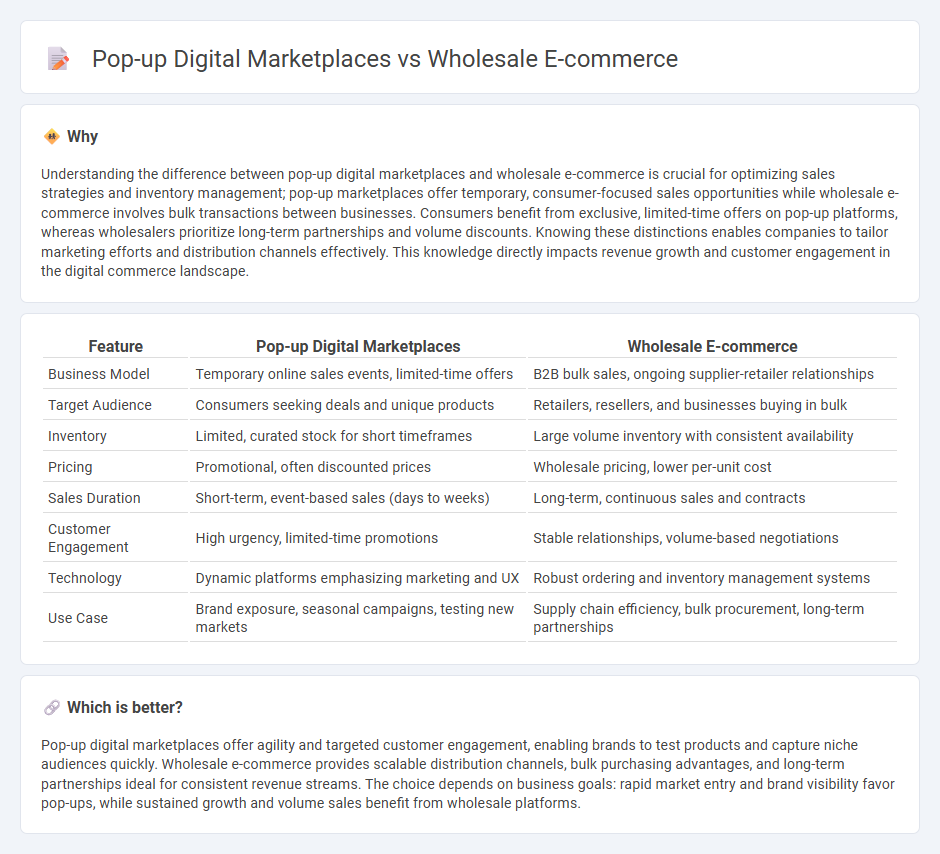
Pop-up digital marketplaces offer flexible, short-term platforms for sellers to reach targeted audiences quickly, contrasting with wholesale e-commerce which focuses on bulk transactions and long-term supplier relationships. Pop-up marketplaces excel in agility and niche targeting, while wholesale e-commerce emphasizes scalable inventory and consistent supply chains. Explore the distinct advantages of each to optimize your commerce strategy.
Why it is important
Understanding the difference between pop-up digital marketplaces and wholesale e-commerce is crucial for optimizing sales strategies and inventory management; pop-up marketplaces offer temporary, consumer-focused sales opportunities while wholesale e-commerce involves bulk transactions between businesses. Consumers benefit from exclusive, limited-time offers on pop-up platforms, whereas wholesalers prioritize long-term partnerships and volume discounts. Knowing these distinctions enables companies to tailor marketing efforts and distribution channels effectively. This knowledge directly impacts revenue growth and customer engagement in the digital commerce landscape.
Comparison Table
| Feature | Pop-up Digital Marketplaces | Wholesale E-commerce |
|---|---|---|
| Business Model | Temporary online sales events, limited-time offers | B2B bulk sales, ongoing supplier-retailer relationships |
| Target Audience | Consumers seeking deals and unique products | Retailers, resellers, and businesses buying in bulk |
| Inventory | Limited, curated stock for short timeframes | Large volume inventory with consistent availability |
| Pricing | Promotional, often discounted prices | Wholesale pricing, lower per-unit cost |
| Sales Duration | Short-term, event-based sales (days to weeks) | Long-term, continuous sales and contracts |
| Customer Engagement | High urgency, limited-time promotions | Stable relationships, volume-based negotiations |
| Technology | Dynamic platforms emphasizing marketing and UX | Robust ordering and inventory management systems |
| Use Case | Brand exposure, seasonal campaigns, testing new markets | Supply chain efficiency, bulk procurement, long-term partnerships |
Which is better?
Pop-up digital marketplaces offer agility and targeted customer engagement, enabling brands to test products and capture niche audiences quickly. Wholesale e-commerce provides scalable distribution channels, bulk purchasing advantages, and long-term partnerships ideal for consistent revenue streams. The choice depends on business goals: rapid market entry and brand visibility favor pop-ups, while sustained growth and volume sales benefit from wholesale platforms.
Connection
Pop-up digital marketplaces and wholesale e-commerce intersect by enabling brands to rapidly scale bulk transactions through temporary online platforms. These marketplaces offer wholesalers flexible channels to showcase large inventories to targeted buyers, enhancing product visibility and accelerating sales cycles. Integration of dynamic pricing tools and real-time inventory management further strengthens the connection between pop-up marketplaces and wholesale e-commerce ecosystems.
Key Terms
Supply Chain Management
Wholesale e-commerce platforms streamline supply chain management by enabling bulk procurement, inventory optimization, and direct supplier relationships that reduce lead times and operational costs. Pop-up digital marketplaces offer flexible, short-term sales opportunities that demand agile supply chain strategies to quickly adapt to fluctuating demand and limited inventory visibility. Explore in-depth analysis and best practices to enhance supply chain efficiency in both wholesale e-commerce and pop-up marketplace models.
Customer Acquisition
Wholesale e-commerce leverages bulk purchasing and long-term supplier relationships to attract established business clients, optimizing customer acquisition through volume discounts and reliable inventory management. Pop-up digital marketplaces prioritize rapid, flexible customer engagement by offering limited-time product selections and personalized shopping experiences that drive immediate consumer interest and sales. Explore how these distinct strategies impact customer acquisition effectiveness and business growth potential.
Platform Scalability
Wholesale e-commerce platforms offer extensive scalability by supporting large product catalogs and high transaction volumes, enabling businesses to grow rapidly through streamlined inventory management and bulk ordering capabilities. Pop-up digital marketplaces prioritize agility and temporary presence, allowing brands to quickly test new markets and products without the long-term commitment of traditional e-commerce infrastructure. Explore the differences in scalability and strategic advantages to choose the best platform for your business growth.
Source and External Links
Faire - Online Wholesale Marketplace for Retailers & Brands - Faire is a platform that connects retailers with brands, facilitating the discovery and purchase of products to stock their stores.
Wholesale Ecommerce Platform - A wholesale ecommerce platform is designed to enable brands to sell products in bulk to retailers at discounted prices for resale.
CommerceWAVE - CommerceWAVE is an AI-powered wholesale ecommerce platform that helps manage complex pricing, custom catalogs, and smarter B2B selling at scale.
 dowidth.com
dowidth.com